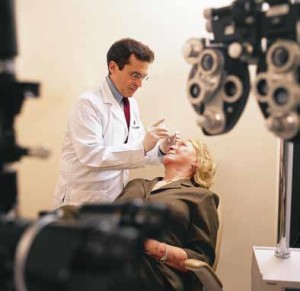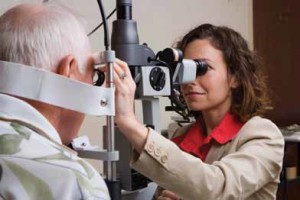Vitamin Supplementation in Age-Related Macular Degeneration
Age-related macular degeneration (AMD) is a common condition that affects the retina and is the leading cause of vision loss in individuals over the age of 50. This condition damages the macula, which is a small spot in the center of the retina that is needed for sharp central vision.
Depending on the stage of AMD, some notice a gradual decrease in vision, but in others the change in vision progresses much faster. As AMD progresses, central vision can become blurred. Blank spots may develop in the central vision and images may appear distorted. AMD does not cause complete blindness, but loss of central vision can interfere with ones ability to read, drive, write and perform simple everyday activities.
Age-related macular degeneration can begin without symptoms, meaning that only a dilated eye exam can detect AMD. The earlier stage of AMD is called dry AMD. In this stage drusen, small yellow deposits, are present under the macula. As dry AMD progresses, the light sensing cells in the macula and their support cells beneath the macula breakdown which causes vision loss in the form of geographic atrophy. Wet AMD is a later stage of the disease that is caused by abnormal blood vessels that grow under the macula and leak fluid and blood. This can cause swelling in and under the retina which can lead to sudden changes in vision, more rapid than vision loss caused by geographic atrophy.
Age-related macular degeneration is common in individuals over 50, and therefore age is the major risk factor for the condition. Other risk factors include smoking, Caucasian ethnicity, and positive family history. One can minimize the risk for AMD or slow its progression by avoiding smoking, exercising regularly, maintaining normal blood pressure and cholesterol levels, and eating a healthy diet rich in leafy, green vegetables.
Vitamin supplementation with a specific formulation of nutrients has been proven to slow the progression of AMD and is recommended for AMD patients. The results of the Age-Related Eye Disease Study 2 (AREDS2) which involved 4,203 patients from 82 clinical centers in the US were published earlier this year and support the use of a specific formulation that includes 500mg of vitamin C, 400 IU of vitamin E, 80mg of zinc, 2mg of copper, 10mg of lutein and 2mg of zeaxanthin. A number of manufacturers offer nutritional supplements that were formulated based on the AREDS2 study.
This supplement can be taken in addition to a daily multivitamin. It has been shown that former smokers had an increased incidence of lung cancer with vitamin A supplementation, and consequently, vitamin A was omitted from the AREDS2 formulation. Also, recent studies have not demonstrated a beneficial effect for fish oil/omega-3 fatty acids in the treatment of AMD.
No benefit has been proven regarding the consumption of bilberry, grape seed oil, or euphrasia (eyebright) for the treatment of AMD. A benefit regarding AREDS2 vitamin supplementation for patients without a diagnosis of AMD has not been established.
Individuals with a family history of AMD and those concerned about AMD should visit their retina specialist for a dilated eye exam and retina evaluation.



Leave a Reply
Want to join the discussion?Feel free to contribute!